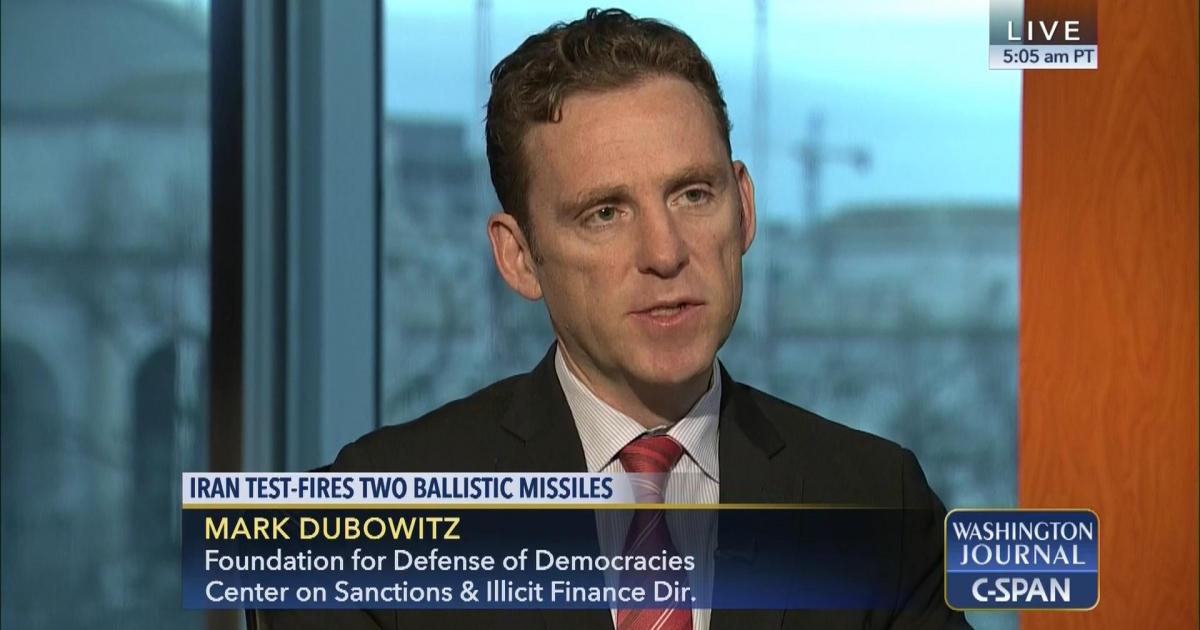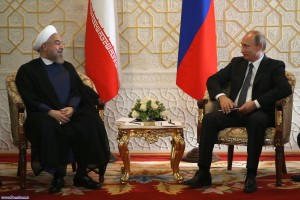by Ben Armbruster
Something interesting and somewhat alarming happened at an event this week on the Joint Comprehensive Plan of Action (JCPOA) — as the Iran nuclear deal is formally known — sponsored by the Atlantic Council. A prominent mainstream media reporter cited Foundation for Defense of Democracies CEO Mark Dubowitz’s criticism of the agreement to a panel that included ambassadors from France, the UK, Germany, and the EU, all of whom support the JCPOA and oppose any effort to undermine it.
Of course, there’s nothing wrong with presenting opposing views at a think-tank event meant to spark debate and discourse. But, in presenting Dubowitz’s point of view as a legitimate criticism of the deal’s particulars, this reporter was seemingly unaware of just who Dubowitz is and what he’s been up to on the Iran issue over the years.
But before getting into that, here’s some brief context. As has been widely reported, the Iran nuclear deal is hanging by a thread. President Trump has threatened to decertify Iranian compliance next month — despite the fact that the International Atomic Energy Agency has said as recently as last month that Iran is in fact complying — and experts, our European partners, and many national security officials in Trump’s own administration worry that the decision would ultimately trigger a collapse of the agreement.
Make no mistake, killing the JCPOA would have devastating consequences for U.S. national security, not least of which is the fact that Iran’s program would be free from the JCPOA’s constraints, potentially putting Tehran on a quick path to the bomb and the United States on a fast track to war.
This is precisely what Dubowitz and a well-funded cadre of neocons and their allies in Washington and beyond want. They don’t want a “better deal” (which can’t be achieved anyway). In fact, they don’t want a deal with Iran at all. Their goal, ultimately, is regime change in Tehran.
Some Iran hawks — like John Bolton for instance — are very vocal about this aim and openly call for war to remove the Iranian regime from power. Dubowitz, however, is more subtle in his advocacy, perhaps understanding that publicly pushing another costly war in the Middle East isn’t necessarily the best way to win mainstream support these days.
That strategy has helped Dubowitz publish op-eds in prominent media outlets, testify on Capitol Hill, and, as was the case this week at the Atlantic Council, establish credible relationships with key reporters covering this issue. In addition to this particular incident, comments and analysis opposing the Iran deal show up regularly in the mainstream press.
As some of the statements Dubowitz has made over the years on Iran clearly demonstrate, his goal in Iran is regime change:
- “[T]he sanctions are working by putting pressure on the [Iranian] regime, although they have not secured their objective and may never do so—putting an end to Iran’s nuclear program. The best way is to work towards changing the regime. Any deal cut with this regime will be violated.” [Ynet News, 4/28/11]
- “[I]f we are going to pursue tougher international sanctions against Iran — and we should — the goal should be regime change in Iran, not stopping proliferation. In fact, regime change would make the idea of an Iranian bomb far more tolerable.” [Bloomberg, 1/16/12, with Reuel Marc Gerecht]
- “Iran is susceptible to a strategy of coerced democratization because it lacks popular support and relies on fear to sustain its power. …The very structure of the regime invites instability, crisis and possibly collapse.” [Memo to the Trump administration co-authored by Dubowitz, as reported by Politico, 6/25/17]
- Journalist John Judis summarized an argument made by Dubowitz and Gerecht in a July 2015 Wall Street Journal op-ed: “Gerecht and Dubowitz argued the dominant Republican strategy of upping sanctions and threatening military force would be ‘unlikely to thwart the mullahs’ nuclear designs.’ The only way to stop Iran from developing nuclear weapons was through a military strike, but a military strike could be justified only if Iran were to violate the agreement it had made.” [Slate, 8/18/15; Wall Street Journal, 7/08/15]
It’s worrying when Dubowitz’s analysis filters into the Iran debate via credible sources because reporters and their readers aren’t getting the full picture of where some of this Iran nuclear deal criticism is coming from and what it ultimately means.
Indeed, when the reporter at the Atlantic Council event mentioned Dubowitz’s Iran deal critique, the moderator interjected: “We should say that Mark Dubowitz has been a harsh critic of this agreement from the very start, and has yet to come up with a substitute for it that would work.”
That’s the key: He “has yet to come up with a substitute for it that would work.” And why would he need to? Dubowitz has his eyes on a larger prize, which has nothing to do with diplomacy or any nuclear agreement.
Ben Armbruster is the communications director at Win Without War and Global Progressive Hub. A version of this post originally appeared as a memo to reporters from Win Without War.






@James Canning, good point and also by self pitying and pretending to be fearful of their neighbors they can continue with their policy of fleecing the US! It’s been their way of living for thousands of years!
Since 1953 with Operation Ajax in which the USA, through the CIA, overthrew Iran’s first democratically elected leader, Mohammed Mossadegh, the USA has continued to install despots in the region in order to steal their natural resources (i.e., oil) and to cement their global range of military power. Iranians are naturally disposed to the benefits of freedom and democracy–this is why Iranian-Americans are the highest educated demographic of any American demographic group, and why they earn the highest per capita incomes.